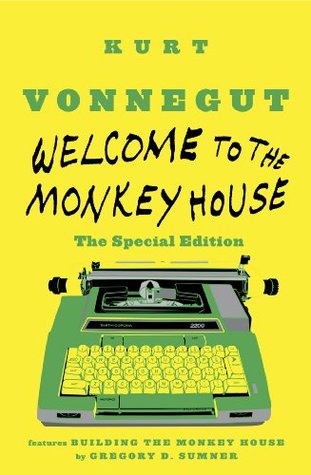More on this book
Community
Kindle Notes & Highlights
“Beware of all enterprises that require new clothes.” —THOREAU
I have been a writer since 1949. I am self-taught. I have no theories about writing that might help others. When I write I simply become what I seemingly must become.
I have already put the question to a college professor, who, climbing down into his Mercedes-Benz 300SL gran turismo, assured me that public relations men and slick writers were equally vile, in that they both buggered truth for money. I asked him what the very lowest grade of fiction was, and he told me, “Science fiction.” I asked where he was bound in such a rush, and learned that he had to catch a Fan-Jet. He was to speak at a meeting of the Modern Language Association in Honolulu the next morning. Honolulu was three thousand miles away.
My first marriage worked, and continues to work. My wife is still beautiful. I never knew a writer’s wife who wasn’t beautiful.
“How did we get so far from home, Newt?” said Catharine. “One foot in front of the other—through leaves, over bridges,” said Newt. “They add up—the steps,” she said.
Herbert dusted off the piano bench with his handkerchief, and sat down gingerly. He took a cigarette from his breast pocket and lighted it. And then the cigarette started to droop slowly from his lips; and, as it drooped, Herbert hunched over the keyboard and his eyes narrowed as though he were focusing on something beautiful on a faraway horizon. Startlingly, Herbert Foster disappeared. In his place sat an excited stranger, his hands poised like claws. Suddenly he struck, and a spasm of dirty, low-down, gorgeous jazz shook the air, a hot, clanging wraith of the twenties.
Nobody could do anything for Herbert. Herbert already had what he wanted. He had had it long before the inheritance or I intruded. He had the respectability his mother had hammered into him. But just as priceless as that was an income not quite big enough to go around. It left him no alternative but—in the holy names of wife, child, and home—to play piano in a dive, and breathe smoke, and drink gin, to be Firehouse Harris, his father’s son, three nights out of seven.
Bears have a way of looking as though they’re pretty much satisfied with everything. The Commodore’s lady didn’t have that look. I could tell she was jumpy about a lot of things.
“But I can still think what I think, can’t I?” she said. “If you have to,” he said.
As a matter of fact, it’s a respectful thing to say that somebody is childish in certain ways, because it’s people like that who seem to get all the big ideas.
“And that, sir, means the end of ambition, the end of greatness!” “Oh, I don’t know about that,” I said. “We’ve got some pretty great people on our side. They’d be great in or out of bodies. It’s the end of fear is what it is.” I looked right into the lens of the nearest television camera. “And that’s the most wonderful thing that ever happened to people.”
“Think of it this way,” said Helmholtz. “Our aim is to make the world more beautiful than it was when we came into it. It can be done. You can do it.” A small cry of despair came from Jim Donnini. It was meant to be private, but it pierced every ear with its poignancy. “How?” said Jim. “Love yourself,” said Helmholtz, “and make your instrument sing about it. A-one, a-two, a-three.” Down came his baton.
He said a stone mason would have time and peace in which to think things out. I did not tell him that a stone mason thinks of little but stones and mortar.
I’m as romantic as the next guy, I think. It’s a question of singing so sweet and having it come out so sour. I never seem to pick the right words.
“Mechanics fix automobiles,” he once observed. “Carpenters build houses. Storytellers use a reader’s leisure time in such a way that the reader will not feel that his time has been wasted.”
“I have been a writer since 1949,” he cautioned. “I am self-taught. I have no theories about writing that might help others. When I write I simply become what I seemingly must become.”


